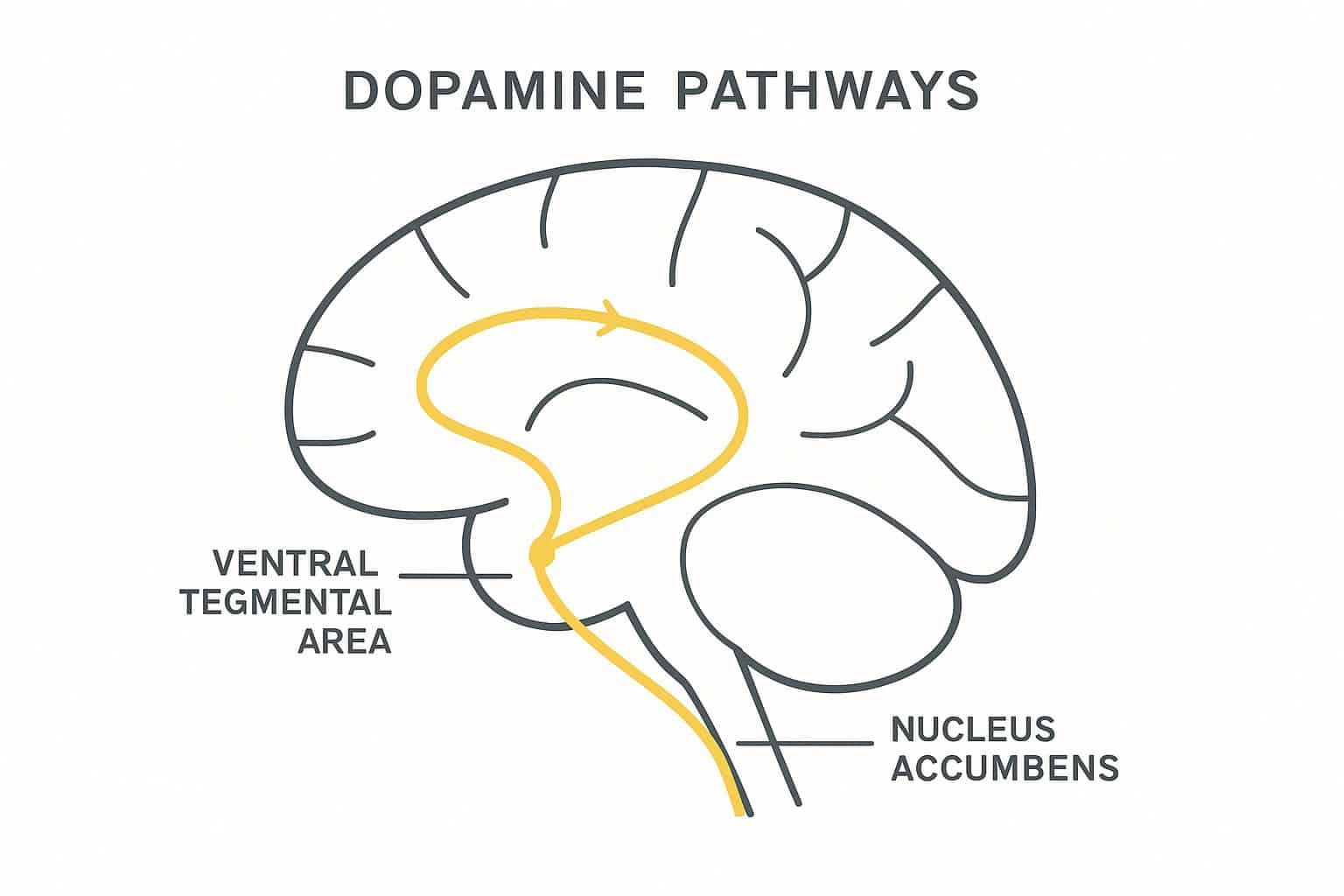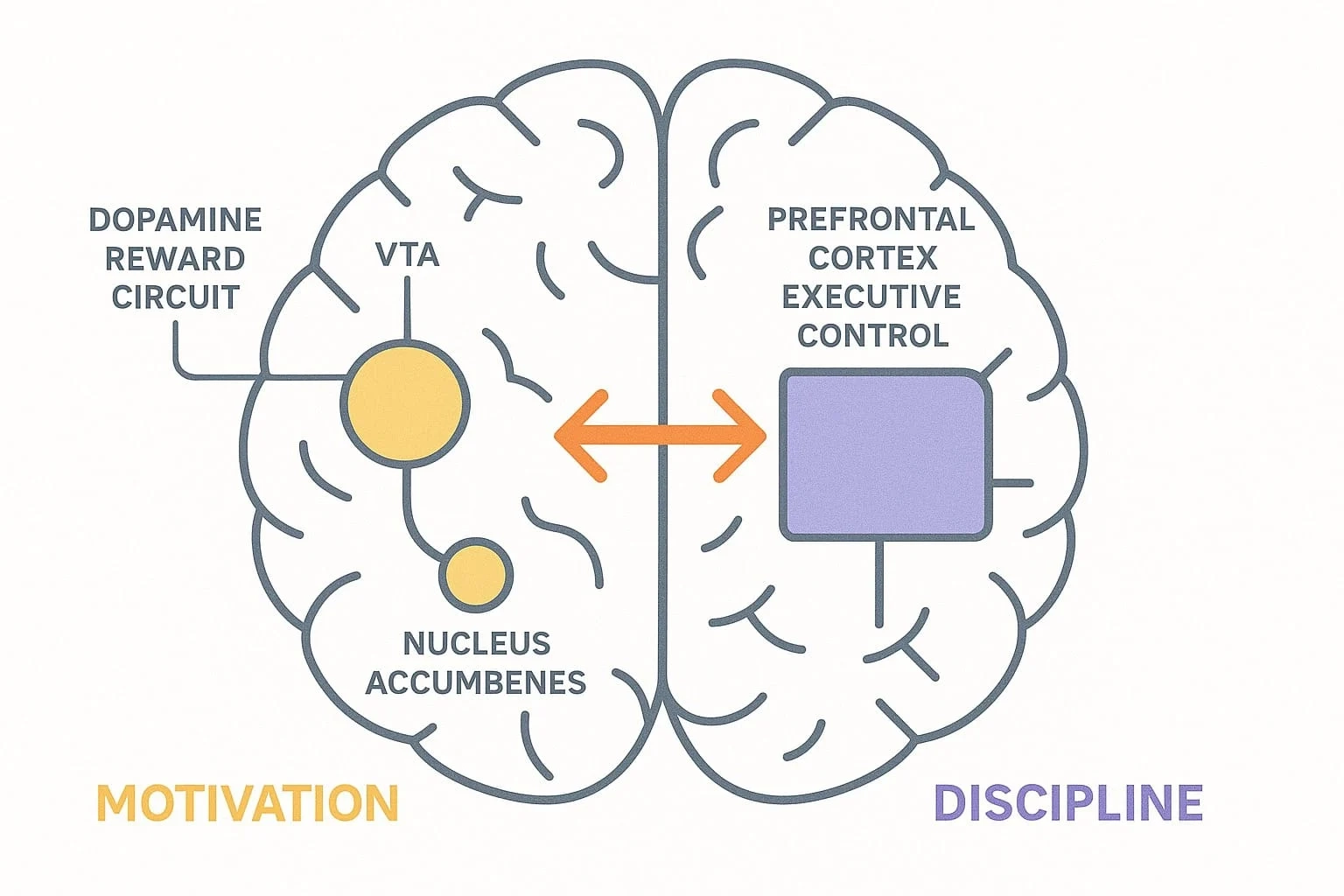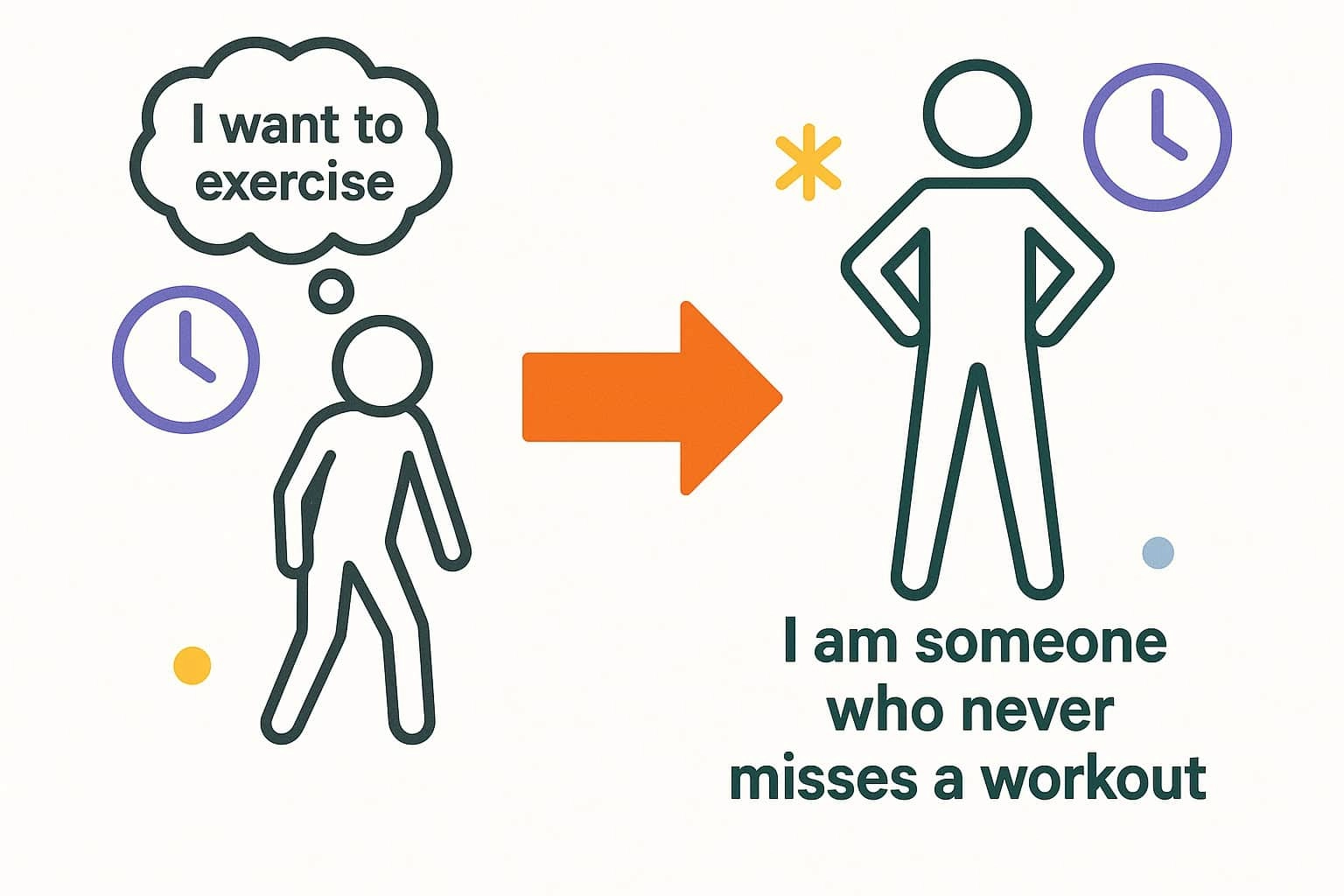The alarm goes off at 5 AM. My hand hovers over the snooze button, and for a split second, Im back to that old familiar battle. The bed feels impossibly warm, especially on these cold mornings. My two sons wont be up for another two hours. Every fiber of my being whispers, just ten more minutes. But heres the thingI dont wait for motivation to strike anymore. I swing my legs out of bed anyway.
This morning ritual has taught me something profound about success, both as a CEO and as a father. Weve all been sold this idea that we need to feel motivated before we act. That we should wait for that surge of inspiration, that perfect moment when everything clicks. Meanwhile, life passes by while were still hitting snooze, waiting for a feeling that might never come. This is the fundamental flaw in the motivation vs discipline debate.
The truth? Understanding the difference between motivation and discipline isnt just some productivity hack. Its the dividing line between those who dream about their goals and those who actually achieve them. Ive seen it play out countless times, both in my own journey building LifeHack and in the thousands of people weve helped.
Today, Im going to show you why discipline beats motivation every single timeand how to build it.
Understanding Motivation: The Spark That Starts the Fire
Think of motivation as lightning in a bottle. Beautiful, powerful, electrifyingand impossible to predict when itll strike next.
At its core, motivation is your brains reward system firing on all cylinders. When you feel motivated, your brain floods with dopamine, that feel-good neurotransmitter that makes everything seem possible. Its the same chemical that lights up when you eat chocolate, fall in love, or win at poker. No wonder it feels so damn good.

Heres the catch: motivation is a fickle friend. Remember that workout plan you started with religious fervor in January? By February, that fire probably dimmed to barely a flicker. Or that side project that consumed your weekendsuntil it didnt.
I once decided to learn Spanish. Bought the books. Downloaded the apps. For two weeks, I was unstoppable. Then life happened. A busy week at work. A Netflix binge. Suddenly, ma�ana became my most-used Spanish word.
The neuroscience is clear: motivation relies on emotional states, which fluctuate like the stock market. Your prefrontal cortex might want to write that novel, but if your limbic system isnt feeling it, good luck getting past page three.
This isnt a character flaw. Its human nature. Motivation runs on feelings, and feelings are about as reliable as weather forecasts. Thats why waiting for motivation to strike before taking action is like waiting for perfect conditions to start living.
Understanding Discipline: The Engine That Keeps You Going
Heres the thing about disciplineits not the iron-willed, teeth-gritting force we imagine. Think of it more like a well-worn path through the woods. The first few times you walk it, youre pushing through brambles, unsure of each step. But after a while? Your feet know the way.
Discipline is really about building systems that work when your brain doesnt want to. Its the habit loop in action: cue, routine, reward. Your alarm goes off (cue), you roll out of bed and hit the gym (routine), you feel accomplished (reward). Repeat this enough, and something magical happensautomaticity kicks in. You stop negotiating with yourself. You just do.
Sure, it feels brutal at first. Your brain fights change like a cat resists a bath. Every fiber screams for the cozy comfort of old patterns. But heres what they dont tell you: discipline has a tipping point. After about 66 days (on average), that uphill battle becomes a gentle slope. Then, surprisingly, it flipsNOT doing the thing feels harder than doing it.
The real power? Compound interest on your efforts. Those daily 20-minute workouts? Theyre not just building muscle; theyre rewiring your identity. Small disciplined actions stack like LEGOs, creating something bigger than their parts. Miss one day, no big deal. Miss two, and youre already rebuilding momentum.
Discipline isnt about becoming a robot. Its about creating freedomfreedom from decision fatigue, from self-doubt, from starting over every Monday.
The Science: What Research Tells Us
Remember that Stanford marshmallow experiment where kids who waited for two marshmallows supposedly became more successful? Well, plot twist a 2018 replication with 918 children found the effect largely disappeared when researchers controlled for socioeconomic factors . Turns out, your zip code might predict success better than your willpower at age four.
But heres where it gets interesting: while early self-control isnt the magic bullet we thought, the neuroscience of discipline tells a different story. Your brain literally has two competing systems the dopamine-driven reward circuit (hello, motivation!) centered in the ventral tegmental area, and the prefrontal cortexs executive control network (team discipline!) . When youre motivated, dopamine floods your nucleus accumbens, creating that I can conquer the world feeling. Discipline? Thats your dorsolateral prefrontal cortex putting on its adult pants and overriding the ooh, shiny! impulses.

Speaking of discipline, forget the 21-day habit myth that came from a plastic surgeon observing physical recovery, not behavior change. Phillippa Lallys groundbreaking study tracked 96 people forming new habits and found it took anywhere from 18 to 254 days, averaging 66 days . The good news? Missing a day wont derail your progress. The bad news? That drink water after breakfast habit might take two months to stick.
What actually predicts long-term success? Angela Duckworths West Point study of 11,000+ cadets revealed that grit passion plus perseverance predicted whod survive Beast Barracks better than IQ or physical fitness . Cadets scoring high on grit had 54% better odds of making it through. Translation: caring deeply about your goals (passion) while showing up consistently (discipline) beats raw talent.
Interestingly, AI coaching is showing promise in building these discipline systems. Recent studies found AI coaches matched human coaches in goal attainment, with participants appreciating the 24/7 availability and judgment-free zone . While AI cant replace human empathy, it excels at consistent accountability perfect for building those discipline muscles when motivation takes a vacation.
Why Discipline Beats Motivation Every Time
Picture Michael Phelps at 5:30 AM, staring at a chlorinated pool in Baltimore. Its 2003, years before his first Olympic gold. The waters cold. His muscles ache from yesterdays 12,000-meter swim. Does he feel motivated? Hell no. But he dives in anyway. Every. Single. Day. Even Christmas.
Heres the brutal truth about motivation vs discipline: motivation is emotion-based, fleeting as a summer crush. Discipline? Thats system-based, as reliable as gravity. One depends on how you feel; the other depends on what youve decided.
Phelps coach Bob Bowman understood this. He didnt build the most decorated Olympian by relying on motivation. He built a machine. Phelps swam 365 days a year for six years straight. Not because he woke up inspiredbut because 10:00 AM meant pool time, period. By the time Beijing 2008 rolled around, those eight gold medals werent won by motivation. They were won by 13,000 hours of showing up when he didnt feel like it.
Ever fallen into the motivation trap? You knowwaiting for that perfect surge of energy before starting your business, writing your book, getting in shape. Meanwhile, successful people operate on a different frequency. Theyve discovered what psychologist William James called the second wind phenomenon: action creates energy, not the other way around.
Consider Serena Williams pre-match routine. The same sequence for twenty years: arrive two hours early, stretch for exactly 40 minutes, hit 50 serves, visualize for 10 minutes. Think she felt pumped for every single match? After 1,000+ professional games? Unlikely. But that routine turned her into a 23-time Grand Slam champion. The system carried her when motivation couldnt.
This is where the 2-minute rule becomes your secret weapon. Cant write a chapter? Write one paragraph. Cant run 5 miles? Lace up your shoes and walk to the mailbox. Stanford researcher BJ Fogg calls this minimum viable habitmake it so small, so stupidly easy, that your brain cant say no. Then watch momentum take over.
Because heres what nobody tells you: discipline compounds while motivation evaporates. Those two minutes become twenty. Those twenty become a habit. That habit becomes your identity. Suddenly, youre not someone trying to writeyoure a writer. Not someone attempting fitnessyoure an athlete.
Stop waiting for lightning to strike. Build your power grid instead.
Building Your Discipline System
Heres the truth bomb: discipline isnt built through willpower its engineered through identity change. Instead of saying I need to exercise, I tell myself I am someone who never misses a workout. See the difference? One is a chore. The other is who I am.
When I first started LifeHack, I wasnt trying to be an entrepreneur. I decided I was an entrepreneur. Every 5 AM wake-up reinforced that identity. Every late night of coding wasnt sacrifice it was simply what entrepreneurs do. My sons now see their dad as someone who does hard things consistently. Thats the legacy Im building, one disciplined day at a time.

Environmental design is your secret weapon. I keep my running shoes by the bed literally trip over them getting up. My phone charges in the kitchen, not the bedroom. The coffee maker is programmed for 4:55 AM. These arent life hacks; theyre guardrails against my weaker self. James Clear calls this making the right thing the easy thing, and damn if it doesnt work.
Non-negotiable routines become your fortress. Mine? Write for 90 minutes before checking email. No exceptions. Not for urgent Slack messages, not for breaking news, not even when my younger son had that science project due (okay, maybe that once). The power isnt in perfection its in the comeback after you break the streak.
Apply progressive overload like youre training for life. Started with 5 pushups? Next week, do 6. Can only meditate for 2 minutes? Make it 2:30. This isnt about heroic leaps; its about 1% improvements that compound into transformation. My first blog post took 8 hours. Now I bang out 2,000 words before breakfast.
Track ruthlessly, but forgive quickly. I use a simple spreadsheet green squares for completed habits, red for missed. The visual punch of a broken chain motivates better than any app. But heres the critical part: self-compassion isnt weakness. When I miss a day (and I do), I dont spiral into self-flagellation. I ask, What can I learn? then get back on track.
Recovery is part of the system, not a break from it. Discipline without rest is a recipe for burnout trust me, Ive got the therapy bills to prove it. Schedule downtime like you schedule work. Your future disciplined self will thank you.
When You Need Both: The Dynamic Duo
Look, Im not saying motivation is useless. That initial spark? Its like rocket fuel for setting your direction. When I decided to transform LifeHack into what it is today, motivation painted the vision. But discipline built it, brick by brick.
Heres the beautiful thing: disciplined action actually creates motivation. Every morning I complete my writing routine, I feel a surge of accomplishment that carries into the rest of my day. Its a virtuous cyclediscipline generates results, results generate motivation, motivation reinforces discipline.
I call these motivational anchors. My sons graduation photo on my desk reminds me why I work. My daily workout log shows me how far Ive come. These arent crutches; theyre strategic reminders that connect my daily disciplines to my deeper why.
Think of motivation vs discipline as your compass and engine. One shows you where to go; the other gets you there.
Conclusion: Your Next 30 Days
Heres your challenge: Pick ONE thing. Just one. Maybe its five pushups every morning. Maybe its writing 100 words daily. The what doesnt matter as much as the doing.
For the next 30 days, do it no matter what. Motivated? Do it. Exhausted? Do it. Inspired? Do it. Overwhelmed? Still do it.
This isnt about the pushups or the writing. Its about proving to yourself that youre someone who follows through. That you dont need to feel like it to do it.
Because once you crack this codeonce you realize discipline is a skill you can build, not a talent youre born witheverything changes. You master the motivation vs discipline equation and become unstoppable.
Your future self is counting on todays decision. What will you choose?




